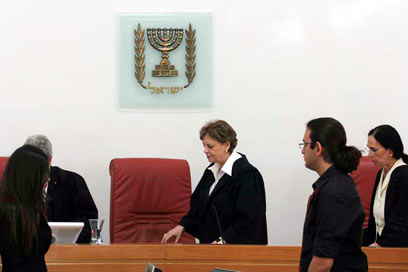Five High Court Justices ruled that the plea bargain, which spares Katsav a jail sentence on sexual assault charges, was too lenient and gave the prosecution 21 days to justify the arrangement.
The court also ordered the State to hand the original draft indictment to the petitioners, a move which the prosecution has so far refused to do despite the leaks to the media.
Enraged by the prosecution's decision to drop rape charges against Katsav, rights groups had petitioned the court to cancel the plea deal and put Katsav on trial for alleged sex offenses against former female employees.
Attorneys Avi Lavi and Avigdor Feldman, Katsav's lawyers, said that they respected the court's decision.
"We believe that this does not testify to the final decision. Eventually the court will realize that the arrangement is appropriate and balanced and will not interfere in the attorney general's decision."
Addressing the court's decision, Deputy State Prosecutor Shai Nitzan said that "this is a very difficult case and this decision was expected.
"I gave the court the reasons for the plea bargain and the difficulties with the evidence. The court listened, and issued an injunction due to the complexity of the issue," he said.

Justice Beinish during Wednesday's hearing (Photo: Gil Yohanan)
The prosecution told the court that there was not enough evidence to try Katsav for rape. Prosecution delegates told the court that there were gaps in the testimony of the main complainant in the case.
In an attempt to explain the State's decision, Attorney Nitzan told the judges, "The version provided by A from the President's Residence was that she could not face Katsav, that she did not agree to anything that happened, while Katsav's version was that nothing happened.
"But there is other evidence. She said that she had two friends in New York, and one of them told us that she was in love with him and that they had a temperamental affair… We call witnesses from the President's Residence, and there an older lady also tells us that she was in love with him and that she was obsessively jealous."
At this point Beinish interfered and said, "So she knows what is happening there, she knows what she is talking about. And this is what the entire ruling referred to as 'taking advantage of authority'… You limited yourselves to something objective. A girl works and gets promoted, and therefore you decided to go for a consensual relationship, assuming there was an affair."
'Reasonable possibility for a colossal acquittal'
Deputy State Prosecutor for Criminal Matters Yehoshua Lamberger said during Wednesday's hearing, "When we came to examine this case, when the evidence started pouring in, we understood that this was a difficult case, almost a tragedy.
"There are two dissonances here: First there are a number of complainants, but with many difficulties, and the second dissonance is that there are doubts in the testimonies of each one. There were many meetings and discussions and examinations, and at a certain stage I was convinced that there is no case in the matter of A from the President's Residence.
"The court must trust us that what was done is legitimate, fair and appropriate. All the real-time evidence does not support severe things, does not support what she says… She can't remember a great part of the rape. 'I don’t remember how I reached the floor.' She can't remember 80 percent of it, and officially she did not tell anyone. There is a reasonable possibility for a colossal acquittal."
A senior official at the State Prosecutor’s Office said in response to the decision, “How are we supposed to appear in court and represent the State now? It is a very uncomfortable feeling.”
“Those (in the prosecution) who were assigned to the case mishandled it; some of them were trying to advance their own agendas at the expense of the attorney general, who may eventually have to pay the price,” he said.
The Justice Ministry said in response, “These comments clearly didn’t come from someone who is familiar with the case”.
Attorneys for the complainant and the petitioners against the plea bargain expressed their satisfaction with the court’s decision.
“We will continue in our fight for justice,” said attorney Kinneret Barashi, who is representing complainant A.
However, she said it was too early to celebrate. “In this case there are only losers – the complainant, the public and the State – and therefore we cannot rejoice. The court’s decision to issue and injunction is an important one,” she said.

















